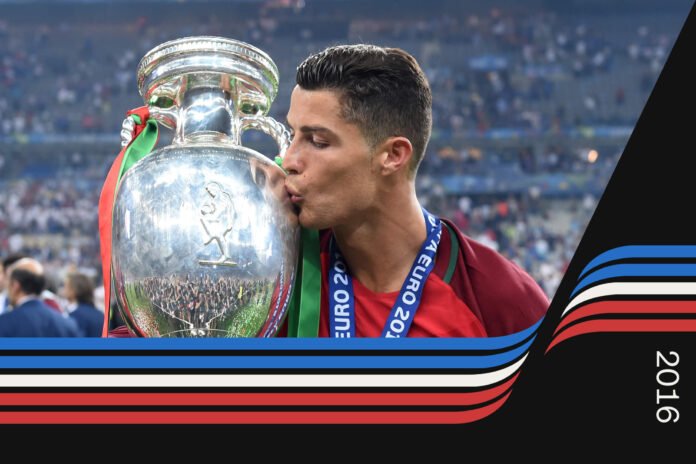This is the latest in our fortnightly series about the 16 triumphant teams in the European Championship before the 17th edition is played in Germany this summer.
We’ve looked at the Soviet Union in 1960, Spain in 1964, Italy in 1968, West Germany in 1972, Czechoslovakia in 1976, West Germany again in 1980, France in 1984, the Netherlands in 1988, Denmark in 1992, Germany in 1996, France in 2000, Greece in 2004, Spain in 2008, and Spain again in 2012. Here’s the penultimate edition: Portugal in 2016.
Introduction
A long-awaited first tournament victory for a nation who had made enormous strides over the previous couple of decades — and missed out harrowingly on a couple of occasions, particularly when losing the final on home soil at Euro 2004. Cristiano Ronaldo was now established as one of the best two footballers in the world and one of the greatest of all time but, like his long-term rival Lionel Messi, there was always a question about whether he could win international honours.
The manager
Fernando Santos made his name at Estoril, with whom he spent the majority of his playing career, before moving on to coach Estrela de Amadora in 1994. He also spent periods with each of the Portuguese ‘big three’, winning the league with Porto and having one-year spells with Sporting and Benfica in his native Lisbon.
But he spent almost as long in Greece, with AEK Athens, Panathinaikos, PAOK and then the Greek national side. Succeeding Euro 2004 winner Otto Rehhagel was a tough task, but Santos took Greece to the knockout stages of Euro 2012 and World Cup 2014, relative successes that earned him the national job in his home country.
As national team coach, Santos earned a reputation as a pragmatist. This Portugal were less free-flowing than previous iterations but instantly became more solid. Santos took charge after predecessor Paulo Bento was sacked following a shock qualification defeat at home to Albania. Santos started with seven wins in a row.
With Portugal, Fernando Santos earned a reputation as a pragmatist (UEFA via Getty Images)
You might be surprised to learn…
Portugal didn’t win any of their three group games. They began with a tame performance in a 1-1 draw with Iceland, which prompted a fairly ridiculous Ronaldo rant about Iceland over-celebrating their point. “A small mentality, that’s why they’ll do nothing”, he said. In the end, Iceland won more games in 90 minutes at the tournament than Portugal. Ronaldo then missed a penalty in a goalless draw with Austria, before scoring twice in a highly eventful 3-3 draw with Hungary, when Portugal trailed three times.
Three draws meant Portugal finished third in the group — in any previous tournament, that would have meant elimination, but in the first 24-team European Championship, Portugal not only squeezed through as one of the best four runners-up, they also found themselves on the weaker half of the draw. Of the eight pre-tournament favourites, Spain, Italy, France, Germany and England were on one half of the draw. Portugal, Croatia and Belgium — zero previous Euros wins between them — were considered the main contenders on the other side of the draw.

Iceland won more Euro 2016 matches in 90 minutes than Portugal (Shaun Botterill/Getty Images)
Tactics
For the previous two decades, Portugal had a reputation for producing several sensational wingers and no top-class centre-forward. In truth, Nuno Gomes, Joao Pinto and Pauleta were more effective than that stereotype would suggest and often brought the best from others with good movement and link play. However, the problem was starker than ever going into 2016. The caveat was that in Ronaldo, they had the most prolific player in Europe.
Ronaldo was still largely playing from the left rather than up front for Real Madrid, but the absence of quality centre-forwards encouraged Santos to shift the system towards more of a 4-4-2, with Ronaldo having licence to play in his favoured inside-left role, Nani performing a similar job from the right, albeit a little deeper, and a quartet that was comprised, more or less, of four central midfielders. Sometimes it felt like a diamond, sometimes more like a flat four.
Really, compared to Portugal’s usual 4-3-3 system, it basically involved getting rid of a striker, bringing in another central midfielder, and everyone else having to adjust accordingly. It was a little bit like the difference between Spain at Euro 2008 and Spain at Euro 2012.
This was more interesting on paper than it was on the pitch. Portugal scored nine goals from the equivalent of eight matches (once you consider that they played three periods of extra time). But they were adept at controlling matches, in possession and in a defensive sense. They filled space dynamically, with Raphael Guerreiro overlapping well down the left and Nani or Portugal’s right-sided midfielder having more responsibility for right-sided width.
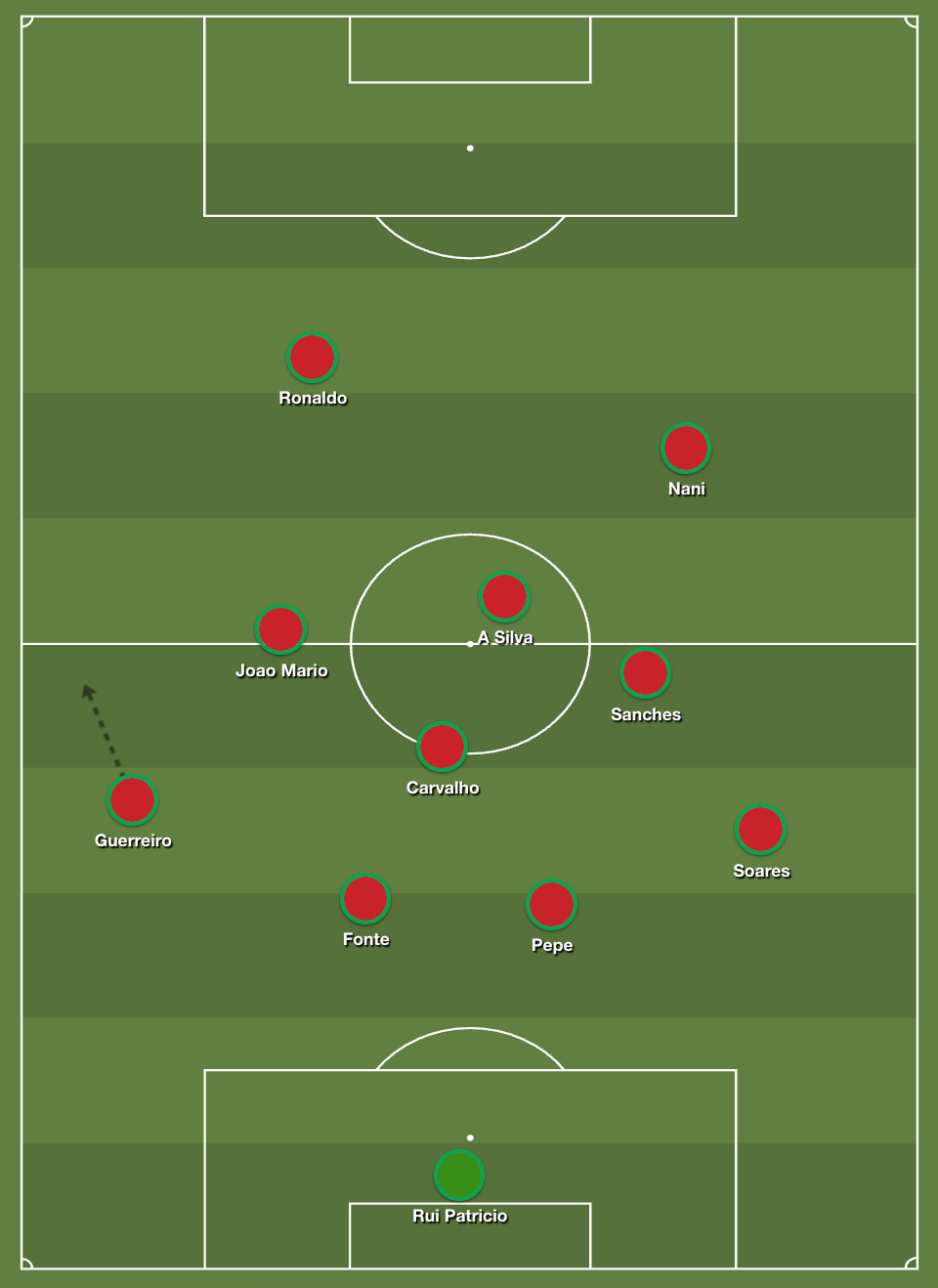
Key player
The main man was clearly Ronaldo, who would win that year’s Ballon d’Or. He scored three goals in the competition, led the line excellently as a centre-forward, and was the team’s off-field leader — quite literally, after getting injured early in the final.
But the real outstanding player over the seven games was 33-year-old Brazilian-born centre-back Pepe. He was initially used as a holding midfielder after declaring for Portugal before Euro 2008, and for much of his career had a reputation as an overly physical, hot-headed centre-back. But by this stage, Pepe had matured into a calmer, more reliable defensive presence.
He was unbeatable in the air throughout this tournament and while a thigh injury forced him to miss the semi-final against Wales and meant he trained separately before the final, Pepe saved his best until last, producing a man-of-the-match display to keep France at bay.
Now 41, Pepe is in line to play in his fifth European Championship this year, remarkable enough in itself, but particularly unusual given Pepe didn’t even qualify to play for Portugal until he was 24.
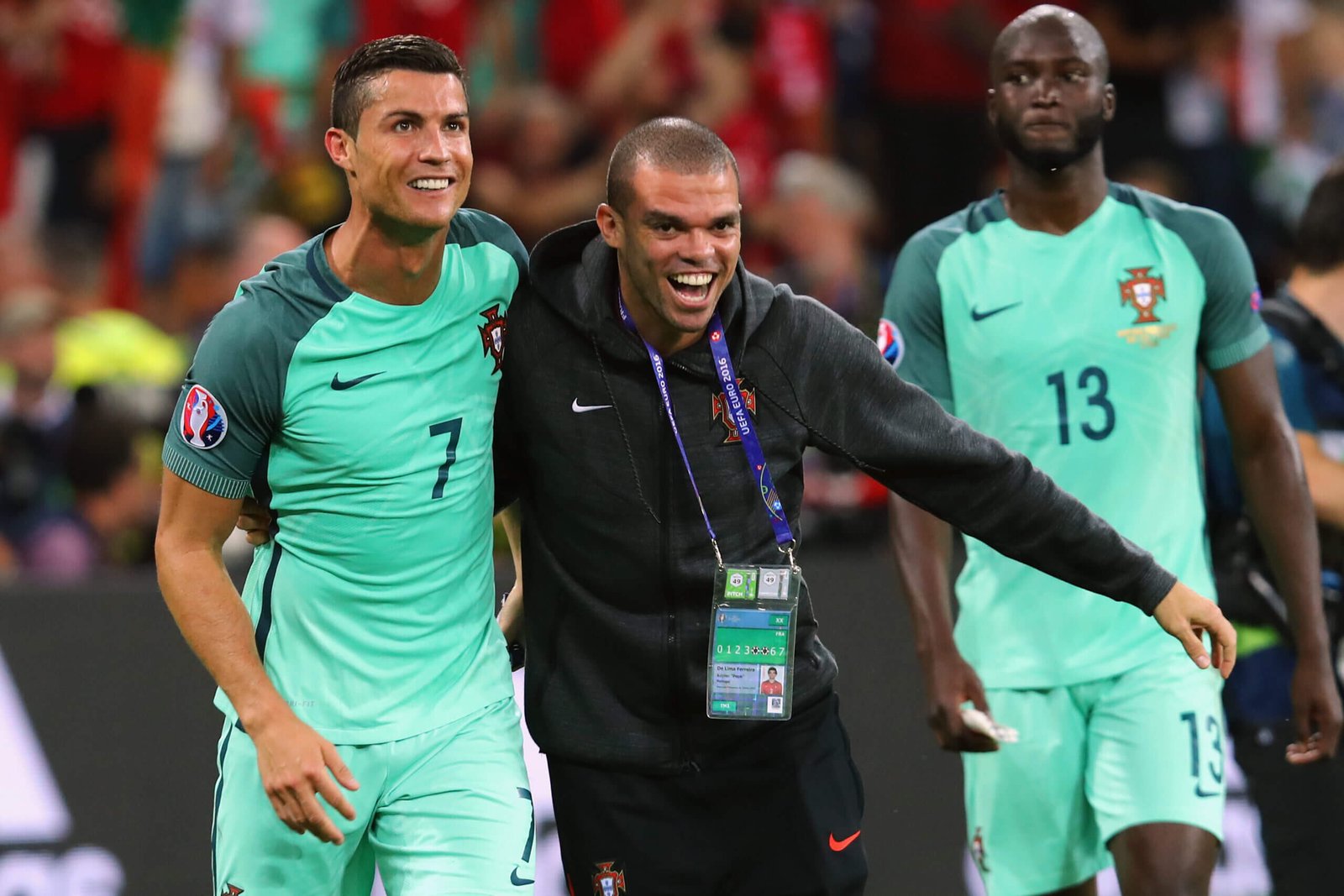
Ronaldo and Pepe were both integral to Portugal’s success (Alex Grimm – UEFA via Getty Images)
The final
Portugal had tasted final defeat in their capital city back in 2004 and here they inflicted the same indignity upon France in Paris. A decision to keep the Stade de France illuminated throughout the previous evening backfired when thousands of moths descended on the stadium and decided to stay throughout the day of the final, even when David Guetta performed at the closing ceremony.
The game itself was slightly overshadowed by Ronaldo’s injury, which was sustained in the first 10 minutes but only resulted in his substitution 15 minutes later. He was replaced by his old Sporting youth team-mate Ricardo Quaresma, who came up with a crucial goal in the second-round win over Croatia but was hardly prolific. Portugal switched to 4-5-1 with Nani up front alone and offered little in attack, failing to record a shot on target until the 80th minute.
France weren’t much better, in fairness. The game’s liveliest attacking player was Moussa Sissoko, a box-to-box midfielder used from the right, which rather summed things up. That said, Antoine Griezmann — the tournament’s top goalscorer and best player — twice went close with headed efforts.
Both sides hit the woodwork, too — France’s Andre-Pierre Gignac after spinning Pepe and scuffing against the near post at the end of normal time and Portugal’s Guerreiro with a lovely flighted free kick that bounced off the bar. It always felt like one goal would win it.
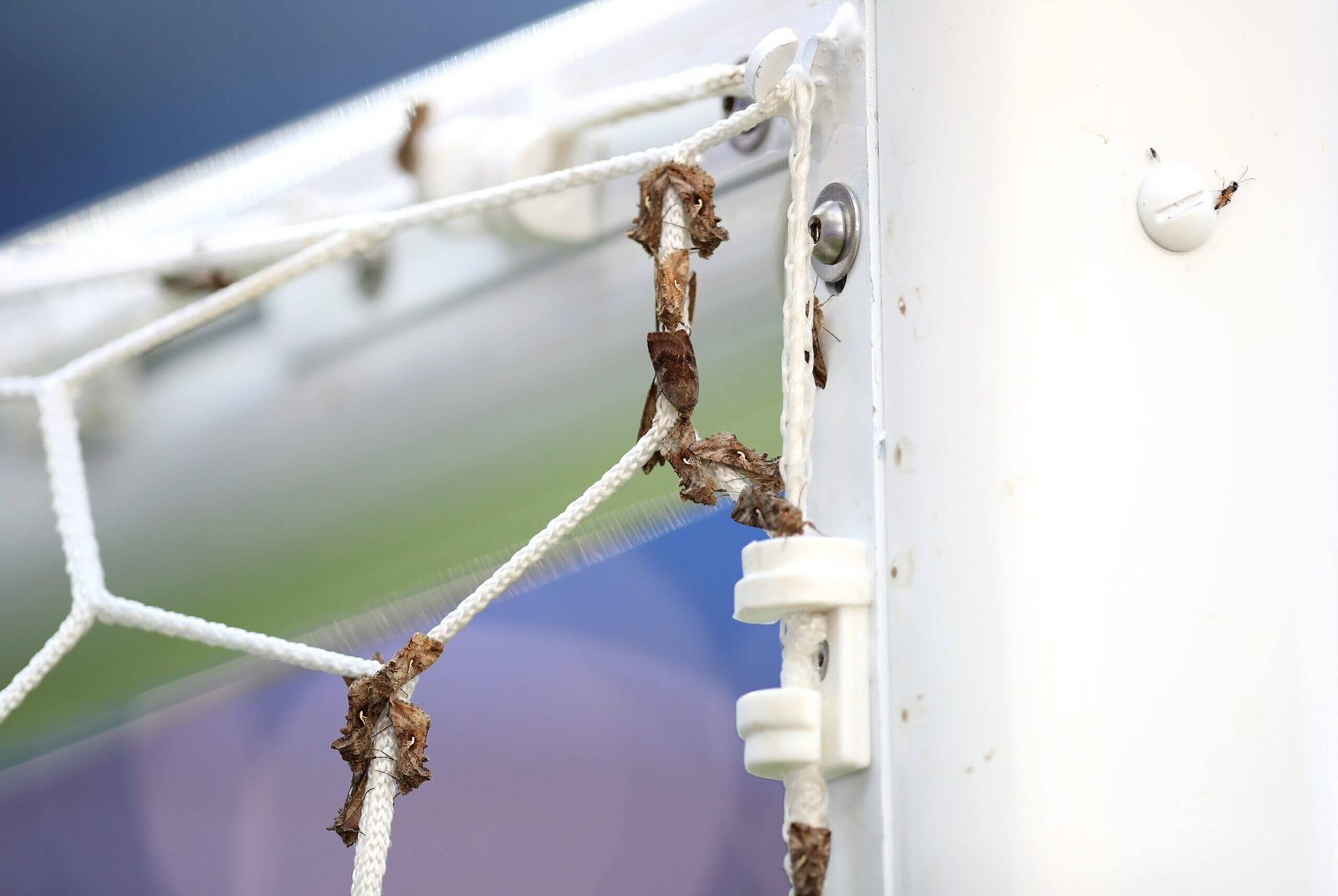
Moths infested the Stade de France before the Euro 2016 final (Mike Egerton/Getty Images)
The decisive moment
It’s difficult to think of many other footballers whose career is so completely based on one moment. Eder was born in Guinea-Bissua and moved to Portugal as a child. He scored 38 top-flight goals over six and half years and earned a £5m ($7m) move to Swansea City in 2015, where he lasted six months, registered no goals and was loaned out to Lille.
He scored in the pre-tournament friendlies against Norway and Estonia but, going into the final, he had played only 13 minutes in the tournament and had not featured in the knockout stage at all. And of course, when Ronaldo limped off, his replacement was a winger, Quaresma. But Santos showed some attacking intent 10 minutes from the end of normal time, when introducing Eder — at last, a proper striker — in place of midfielder Renato Sanches.
With eight minutes remaining of extra time, Eder received the ball with absolutely no support, held off Laurent Koscielny and, from 25 yards, produced a low shot that caught out Hugo Lloris and found the net. He was an entirely unexpected hero. But the scorer of the most important goal in Portugal’s history was a nod to their many internationals over the years to have been born in Africa: William Carvalho, Rui Jordao, Mario Coluna, and, of course, Eusebio.
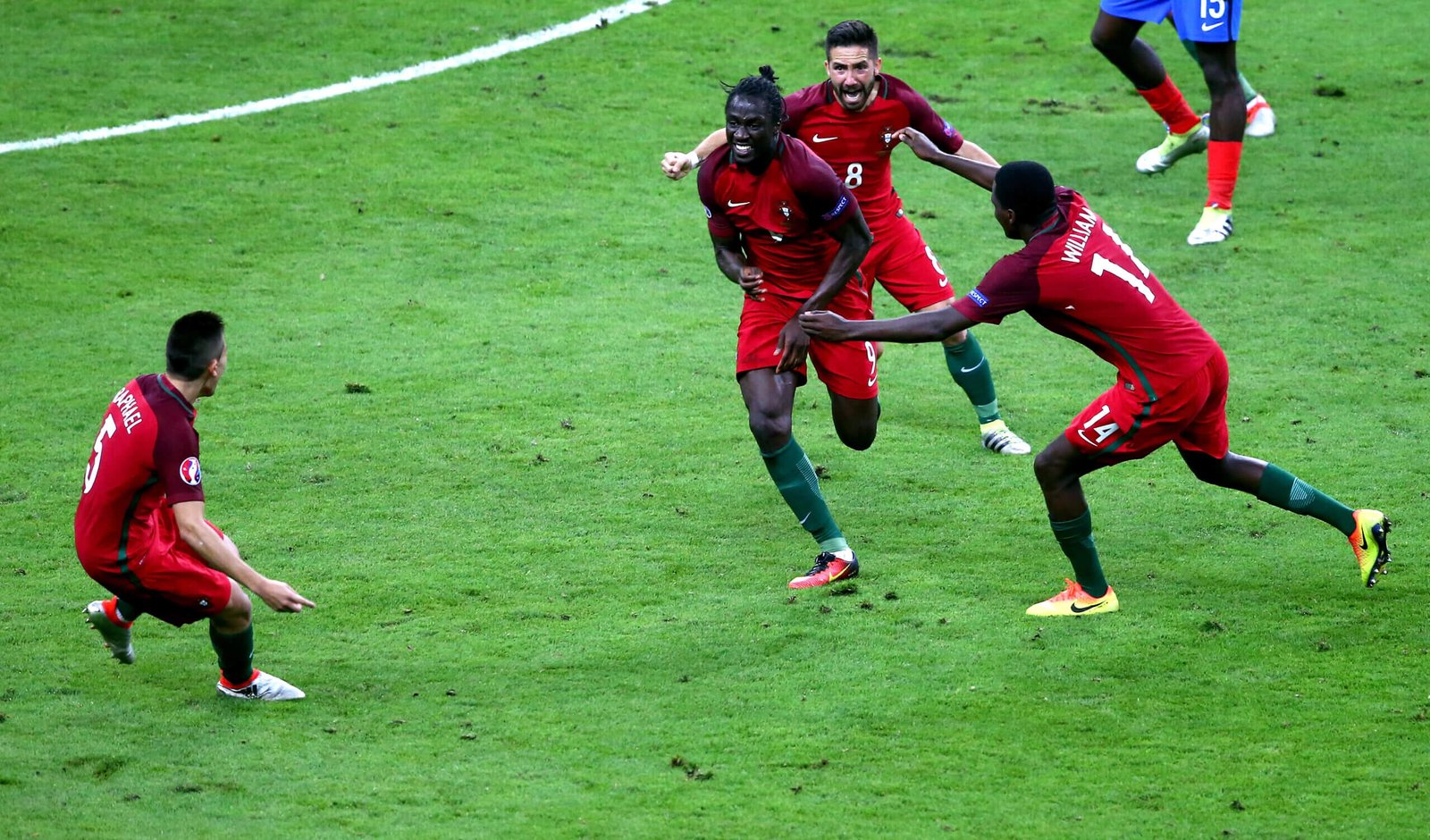
Eder celebrates his crucial goal against France (Alex Livesey/Getty Images)
Were they definitely the best team?
Most certainly not. No wins in the group stage, a 117th-minute winner against Croatia in the second round, penalties against Poland in the quarter-final, a charitable semi-final draw against Wales, and then a 109th-minute winner against France. Portugal were leading for just 11 per cent of the tournament — 73 of their 720 minutes. The best team was surely one of France and Germany, who contested the other semi-final, or perhaps even Italy, who lost to Germany on penalties at the quarter-final stage having produced a truly outstanding performance to eliminate Spain in the second round.
In fact, you can put forward a good argument that Portugal were actually better in the 2000, 2004, 2008 and 2012 editions. But this was an overdue reward for their development as a footballing nation.
Portugal had only qualified for three World Cups or European Championships in the 20th century — 1966, 1986 and 1996 — but by 2016, they were such regulars in the knockout stage that eventually, a tournament success was inevitable.
(Top photo: Pressefoto Ulmer via Getty Images)
Read the full article here


